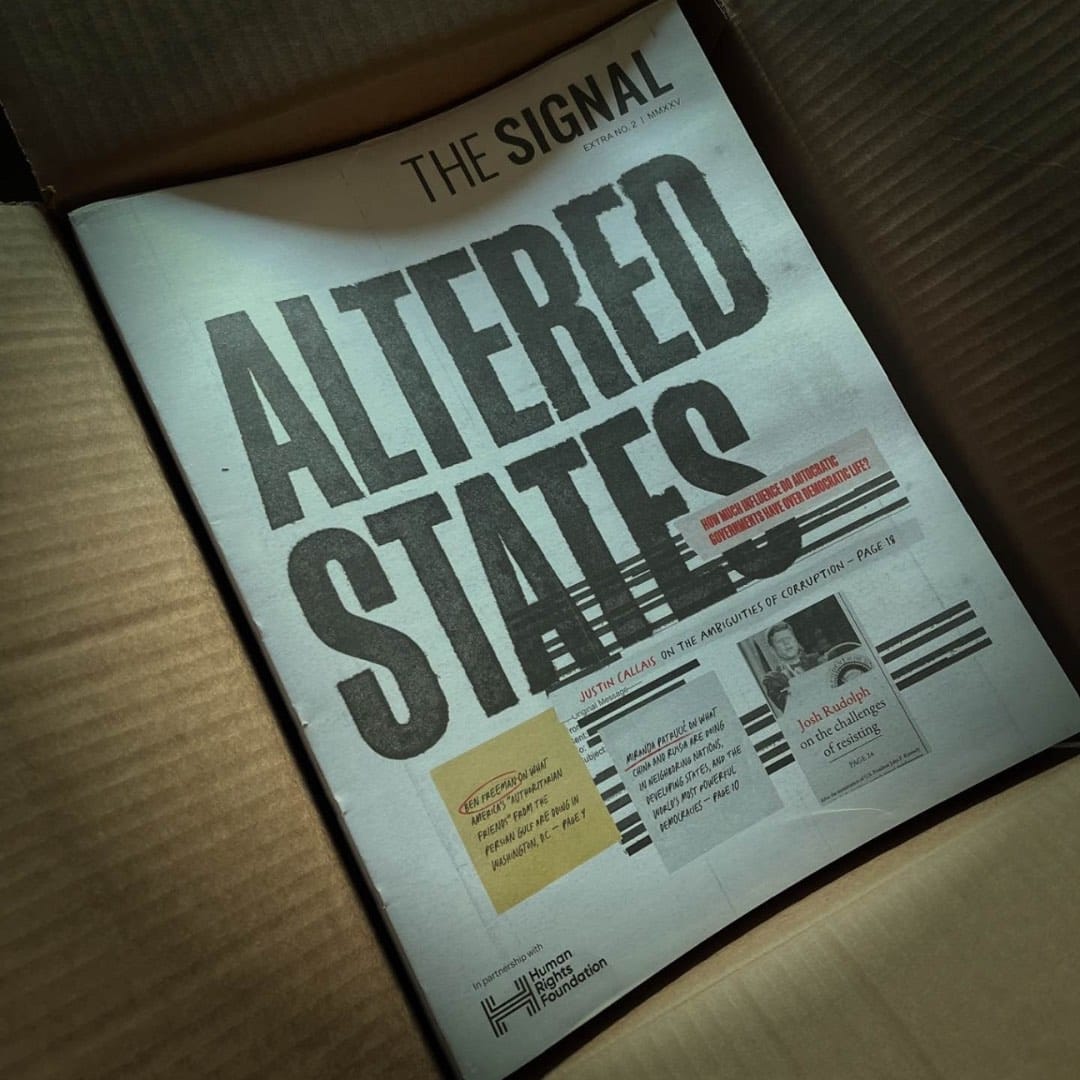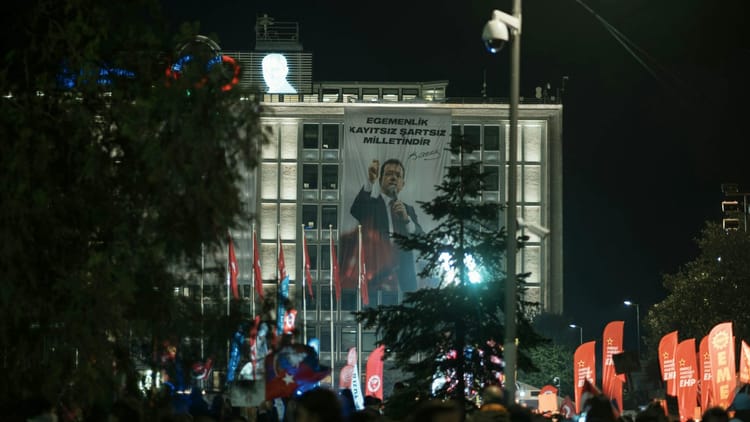Eight votes

Recently—in the weekend despatch: What’s happening when people can verify less and less about their government while it sees more and more about them? The information architecture behind the U.S. shutdown’s blackout on federal economic data.
Today: Why did eight Democrats in the U.S. Senate vote to end America’s longest-ever government shutdown without securing any of what they’d been demanding for five weeks? The bill they advanced on Sunday gives them only the promise of a future vote—with no guarantees.
+ For members: Why does the American military budget keep getting bigger? William D. Hartung’s and Ben Freeman’s new book, The Trillion Dollar War Machine.
& New music from Call Super ...
On the 41st day
The U.S. Senate voted 60-40 on Sunday night to advance legislation ending America’s 40-day government shutdown—the longest in the country’s history. Eight Democrats broke with their party to join the Republicans, barely meeting the chamber’s 60-vote threshold. Fourteen previous attempts had failed over five weeks, with the Democrats demanding an extension of health-care subsidies that help 21 million Americans afford coverage—and that expire in January. Without an extension, premiums could spike as much as 75 percent for some. Sunday’s deal includes no extension—only the promise of a Senate vote by December, with no guarantee that the House of Representatives will act in concert. Democrats appear to have given in without getting what they demanded. Why?
Air traffic controllers had been working without pay for weeks, and the U.S. Federal Aviation Administration ordered that flights be cut up to 10 percent this week. Food stamp recipients got only 65 percent of their November benefits, until courts intervened on Sunday. But none of this was fundamentally different from conditions two weeks ago. Senator Angus King of Maine—an Independent who caucuses with Democrats—said the party changed course “because it wasn’t working,” though it’s not entirely clear what he means by “working.” The Democrats’ Senate leader, Chuck Schumer, voted no, calling the deal something he couldn’t support “in good faith.” The eight who broke cited the shutdown having gone on “long enough.” It seems either the Democrats extracted something that’s not yet visible in the deal, or they just concluded the strategy had failed, or else they’d never had much real leverage to begin with. We may not know which now, but the distinctions will matter when those subsidies expire in seven weeks.

Meanwhile
- A deadly incident at Red Fort. A car exploded at a red light near Delhi’s Red Fort metro station on Monday evening, killing at least eight people and injuring 19 others. The blast ignited a fire that engulfed six vehicles, two e-rickshaws, and an auto-rickshaw in the crowded tourist area. India’s Home Minister Amit Shah said investigators are examining CCTV footage and exploring “all possibilities.” India placed several states on high alert. The cause remains unknown—officials haven’t ruled out mechanical failure, an accident, or an attack.
- India’s voter revision begins. India’s Election Commission launched a special intensive revision of electoral rolls on Monday across 12 states, affecting more than half a billion voters. The process involves house-to-house verification to remove duplicates and add new voters. Rahul Gandhi, the leader of the opposition, called the exercise a “cover-up” for alleged “vote theft,” claiming officials manipulated voter lists in recent state elections in Haryana, Maharashtra, Madhya Pradesh, and Chhattisgarh. The Election Commission rejected the allegations, noting no one filed appeals challenging the rolls in those states. … See “Deleted.”
- Seventy-seven pardons. President Donald Trump pardoned 77 allies involved in efforts to overturn the 2020 election, including his former attorney Rudy Giuliani, his former chief of staff Mark Meadows, the attorneys Sidney Powell and John Eastman, and the former Department of Justice official Jeffrey Clark. The pardons, signed on Friday and announced on Sunday, cover those charged in state cases for submitting false elector certificates claiming Trump won states that Joe Biden carried in 2020. Presidential pardons apply only to federal crimes—none were charged federally—making the gesture largely symbolic. The proclamation called prosecutions “a grave national injustice.”
- From Damascus to Washington. The UN Security Council voted 14-0 on Thursday to remove Syria’s President Ahmed al-Sharaa from terrorism-sanctions lists, with China abstaining. The resolution lifts asset freezes and travel bans imposed when al-Sharaa led Hayat Tahrir al-Sham, which the Council had designated a terrorist organization since 2014. He took power in December 2024 after forces under his command overthrew the dictator Bashar al-Assad in 12 days. Al-Sharaa arrived in Washington on Saturday for a meeting with Trump today—the first Syrian president to visit since 2000, when Bill Clinton met Assad’s father.
- After the typhoon. Typhoon Kalmaegi killed at least 188 people in the Philippines and five in Vietnam after making landfall on Thursday in central Vietnam with winds reaching 149 kilometers an hour. The storm devastated the Philippines’ Cebu province, displacing 500,000 people. The country’s president, Bongbong Marcos, declared a state of national calamity on Thursday; 127 people remain missing. In Vietnam, 1.2 million households lost power, 57 houses collapsed, and 2,593 were damaged. The storm dissipated on Friday, although another potential super-typhoon is now approaching the region.

How much influence do dictators have over democracies? Our second limited-run print magazine, Altered States …
Currently available in the U.S.A. If you’re interested in ordering internationally, have any questions, be in touch: concierge@thesgnl.com.
From the latest despatch
War machine
Why does the U.S. military budget keep getting bigger? William D. Hartung and Ben Freeman, The Trillion Dollar War Machine: How Runaway Military Spending Drives America Into Foreign Wars and Bankrupts Us at Home.

In the lead-up to the last U.S. presidential election, Donald Trump said, “I will expel the warmongers. We have these people; they want to go to war all the time. You know why? Missiles are $2 million apiece. That’s why.” He promised that he would “expel the warmongers from the national-security state and carry out a much-needed cleanup of the military-industrial complex.” Having won the election, Trump then went on to pledge to increase the Department of Defense’s budget by more than $100 billion, taking it to $1 trillion in total—which isn’t even counting the various military-related intelligence budgets of, say, the Central Intelligence Agency.
Why all this spending?
Your loyal guide to a changing world.
Membership with The Signal means exclusive access to premium benefits:
- Regular profiles on the questions behind the headlines
- In-depth feature interviews with our network of specialist contributors from across America and around the world
- The despatch, our weekly current-affairs and cultural-intelligence briefing
- Early access to new products, including print extras
It also means vital support for an independent new enterprise in current-affairs journalism.
New music
‘Mothertime’
Some top-shelf U.K. bass music from the British producer Joseph Richman-Seaton—a.k.a., Call Super. This single concludes a new compilation album he’s part of. Chunky bass tones fragment the vocal samples until the last third, when the dust clears.





